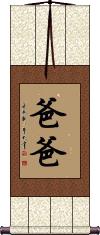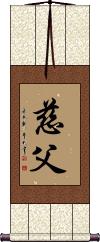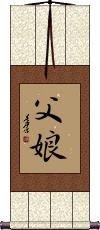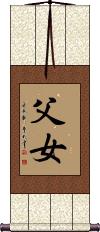Many custom options...
And formats...

Daddy Father in Chinese / Japanese...
Buy a Daddy Father calligraphy wall scroll here!
Personalize your custom “Daddy Father” project by clicking the button next to your favorite “Daddy Father” title below...
Daddy / Father
爸爸 is the colloquial way to say “Daddy” in Chinese.
Sometimes Chinese people will refer to their father with just one of these characters, “Ba,” which would be like “Dad.” With both characters, “Baba,” it's more like “Daddy.”
爸爸 is really a weird selection for a wall scroll, so consider this entry to be for educational purposes only (don't order this).
Loving Father
慈父 is the title of a loving father, affectionate father, or merciful father.
A great gift for your dad.
Father and Son
Father and Daughter
Father and Daughter
父女 is a title for “father and daughter” in Chinese.
Note: 父女 is an unusual word for a calligraphy wall scroll.
Daddy’s Girl / Daddy’s Boy
This in-stock artwork might be what you are looking for, and ships right away...
Gallery Price: $61.00
Your Price: $33.88
Not the results for Daddy Father that you were looking for?
Below are some entries from our dictionary that may match your Daddy Father search...
| Characters If shown, 2nd row is Simp. Chinese |
Pronunciation Romanization |
Simple Dictionary Definition |
老子 see styles |
lǎo zi lao3 zi5 lao tzu roushi / roshi ろうし |
More info & calligraphy: Lao Tzu / LaoziLaozi; Lao Tzu; Lao Tse; (person) Laozi (semi-legendary Chinese philosopher and deity); Lao Tzu; Lao Tse Laozi, or Laocius, the accepted founder of the Daoists. The theory that his soul went to India and was reborn as the Buddha is found in the 齊書 History of the Qi dynasty 顧歡傳. |
お父 see styles |
otou / oto おとう |
(honorific or respectful language) (familiar language) (abbreviation) daddy; father; husband |
御父 see styles |
otou / oto おとう |
(honorific or respectful language) (familiar language) (abbreviation) daddy; father; husband |
お父ん see styles |
oton おとん |
(familiar language) (kana only) (ksb:) (See お父さん・1) dad; daddy; papa; father |
父さん see styles |
tousan / tosan とうさん |
(See お父さん・1) father; dad; papa; pa; pop; daddy; dada |
お父さん see styles |
otossan おとっさん otousan / otosan おとうさん |
(out-dated or obsolete kana usage) (honorific or respectful language) father; dad; papa; pa; pop; daddy; dada; (honorific or respectful language) father; dad; papa; pa; pop; daddy; dada |
御父さん see styles |
otossan おとっさん otousan / otosan おとうさん |
(honorific or respectful language) father; dad; papa; pa; pop; daddy; dada |
Variations: |
otou / oto おとう |
(honorific or respectful language) (familiar language) (abbreviation) (See お父さん・1) daddy; father; husband |
Variations: |
otou / oto おとう |
(honorific or respectful language) (familiar language) (abbreviation) (See お父さん・1) daddy; father; husband |
Variations: |
otousan(p); otossan(ok) / otosan(p); otossan(ok) おとうさん(P); おとっさん(ok) |
(1) (honorific or respectful language) (See 父さん) father; dad; papa; pa; pop; daddy; dada; (2) (honorific or respectful language) husband; (pronoun) (3) (colloquialism) (of person older than speaker) you; he; him |
Variations: |
otousan(p); otossan(ok) / otosan(p); otossan(ok) おとうさん(P); おとっさん(ok) |
(1) (honorific or respectful language) (See 父さん) father; dad; papa; pa; pop; daddy; dada; (2) (honorific or respectful language) husband; (pronoun) (3) (familiar language) you (of an elderly person older than the speaker); he; him |
The following table may be helpful for those studying Chinese or Japanese...
| Title | Characters | Romaji (Romanized Japanese) | Various forms of Romanized Chinese | |
| Daddy Father | 爸爸 | bà ba / ba4 ba / ba ba / baba | pa pa / papa | |
| Loving Father | 慈父 | jifu | cí fù / ci2 fu4 / ci fu / cifu | tz`u fu / tzufu / tzu fu |
| Father and Son | 父息子 | chichi musuko chichimusuko | ||
| Father and Daughter | 父娘 | chichi musume chichimusume | ||
| Father and Daughter | 父女 | fù nǚ / fu4 nv3 / fu nv / funv | fu nü / funü | |
| Daddy’s Girl Daddy’s Boy | お父さん子 | otousanko / otosanko | ||
Successful Chinese Character and Japanese Kanji calligraphy searches within the last few hours...










